
September 22
1862 Otto von Bismarck becomes premier of Prussia: Otto von Bismarck was born in Brandenburg, Germany in 1815. He studied law and agriculture and in 1847 entered the new Prussian Parliament as an ultra-royalist who was totally opposed to democracy. During the 1848 Revolutions he argued against constitutional reform but as a member of the Federal German Diet at Frankfurt demanded equal rights for Prussians.
Bismarck served as a foreign ambassador in Russia (St. Petersburg: 1859) and France (Paris: 1862). Recalled in 1862 he became President of Prussia. Over the next few years Bismarck helped to reorganize Germany under the leadership of Prussia. In 1870 Bismarck deliberately provoked the Franco-Prussian War and as a result was able to obtain Alsace and Lorraine from France. To counteract the danger of Russia and France joining forces against Germany, Chancellor Bismarck formed the Triple Alliance in 1879.
Bismarck dealt severely with trade unionists but in an effort to reduce the appeals of socialism, Bismarck he introduced the world's first modern welfare scheme which provided sickness, accident and old age benefits (1883-87).
After a dispute with Kaiser Wilhelm II, Bismarck resigned from office in March, 1890. Otto von Bismarck, who spent the rest of his life in retirement, died in 1898. [For further details, Click here.] 1869 Wagner's opera Das Rheingold is produced in Munich. 1882 Birth: Wilhelm Keitel: Commander-in-Chief of the German armed forces supreme command (OKW) from February 4, 1938, until dismissed on May 13, 1945. Promoted to the rank of field marshal-general in 1940. Slavishly devoted to Hitler, he will be sentenced to death at Nuremberg and executed on October 15, 1946, for signing orders (including the Commissar Order) to execute hostages. [For further details, Click here.] 1914 Various:
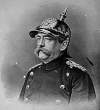
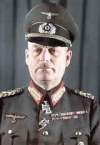
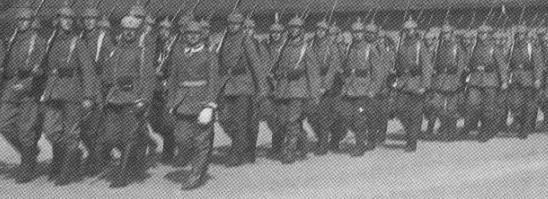
The German cruiser Emden bombards Madras, India, destroying 346,000 gallons of fuel and killing five civilians. The exploits of this lone, resourceful cruiser will capture world attention and establish tactics for commerce raiding. It will also give tradition to a new navy.
On the night of September 22 Emden attacked Madras, a major Indian port, firing 125 shells in ten minutes into the oil storage and destroying 350,000 gallons of oil. The local forts returned 6in fire but failed to score any hits. As well as the physical damage this attack did considerable damage to British prestige and caused major disruption to shipping.
She sank eighteen merchantmen, converted another to an armed merchant cruiser and captured and used three colliers. She had also raided two allied ports and sank a cruiser and a destroyer as well as causing major disruption to shipping and tying down a large number of enemy warships. Throughout the voyage she had maintained an excellent reputation for "gentlemanly" behaviour, not a single person from the merchant ships she sank was killed, prisoners were well treated and released at the earliest opportunity, enemy wounded were treated as best they could and neutral ships were treated as such. [For further details, Click here.]
U-boat devastates British squadron:
In the North Sea, the German U-9 submarine sinks three British cruisers, the Aboukir, the Hogue, and the Cressy, in just over one hour. The one-sided battle, during which 1,400 British sailors lost their lives, alerted the British to the deadly effectiveness of the submarine, which had been generally unrecognized up to that time.
The German U-boat was a submarine far more sophisticated than those built by other nations at the time. The typical U-boat was 214 feet long, carried 35 men and 12 torpedoes, and could travel underwater for two hours at a time. In the first few years of World War I, the U-boats took a terrible toll on Allied shipping. Germany's quarantine of the British Isles was almost successful, but in 1917 unrestricted U-boat attacks on neutral American vessels traveling to Britain prompted the U.S. entrance into the war. The infusion of American ships, troops, and arms into World War I turned the tide of the war against Germany. (History.com)
Picardy Sep 22-26: Fierce battles are fought.
German naval forces bombarded Papeete in French Polynesia. [For further details, Click here.]

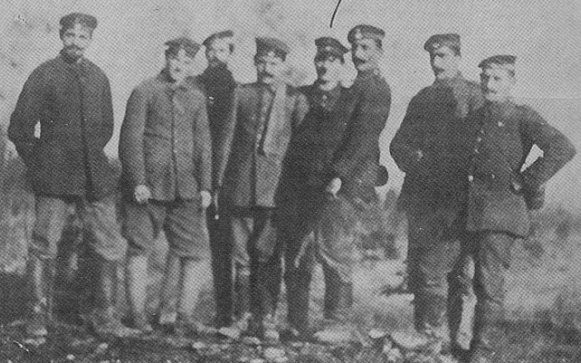
Hitler and his fellow dispatch runners
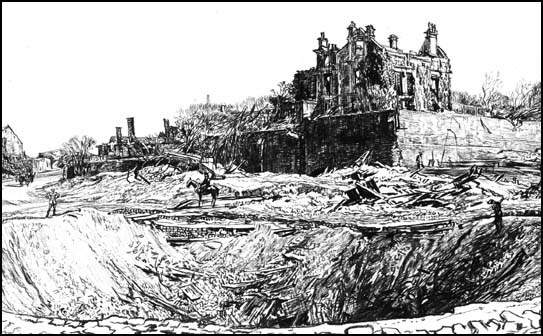
1918 World War I: Palestine: British and Arabian troops under General Allenby take Haifa and Nazareth, as they defeat Turkish forces in the Battle of Samaria.
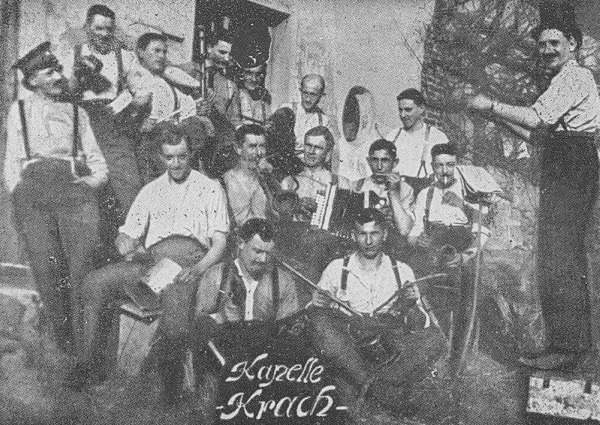

1919 US President Woodrow Wilson abandons his national tour in support of the League of Nations when he suffers a case of nervous exhaustion.
1929 Weimar: Communist and Nazi factions clash in the streets of Berlin.
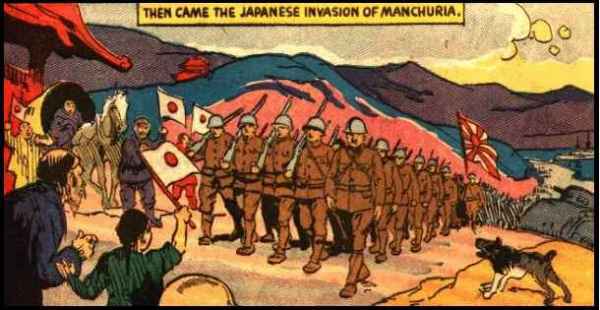
1931: From a telegram to the US Secretary of State from the US Minister in China:
According to all information available to me here, I am driven to the conclusion that the forceful occupation of all strategic points in South Manchuria, including the taking over and operation of public utilities, banks, and in Mukden at least the functions of civil government, is an aggressive act by Japan apparently long planned and when decided upon most carefully and systematically put into effect. I find no evidence that these events were the result of accident. [For further details, Click here.]
[See: Countdown to Infamy: Timeline to Pearl Harbor.] From Twentieth Century History by Tony Howarth:The invasion of Manchuria had two important side effects, putting aside for a moment its dreadful revelation that the League was powerless in the face a determined aggressor. First, it raised the prestige of the Japanese Army. Second, it made it possible for the Army to pressure the Japanese government to undertake a policy of armed expansion.
1933 Nazi Germany: The State Chamber of Culture Law is passed, reestablishing a Reich Chamber of Culture. 'Non-Aryans' are restrained from participating in German culture, the arts, literature, music, and related fields.
1938 Various:
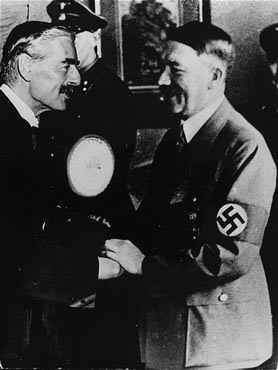
Sudeten Crisis: Sep 22-23: Chamberlain meets with Hitler at Bad Godesberg to discuss events in Czechoslovakia and Hitler's continuing demands for the Sudetenland.
Czechoslovakia: Premier Milan Hodza resigns and a new government is formed by General Jan Sirovy.
Spanish Civil War: The International Brigades withdraw from Spain.
1939 Various:
From a memorandum by the German naval war staff:
Flag Officer U-boats intends to give permission to U-boats to sink without warning any vessels sailing without lights . . . . In practice there is no opportunity for attacking at night, as the U-boat cannot identify a target which is a shadow in a way that entirely obviates mistakes being made. If the political situation is such that even possible mistakes must be ruled out, U-boats must be forbidden to make any attacks at night in waters where French and English naval forces or merchant ships may be situated. On the other hand, in sea areas where only English units are to be expected, the measures desired by Flag Officer U-boats can be carried out; permission to take this step is not to be given in writing, but need merely be based on the unspoken approval of the Naval Operations Staff. U-boat commanders should be informed by word of mouth, and the sinking of a merchant ship must be justified in the War Diary as due to possible confusion with a warship or an auxiliary cruiser. In the meanwhile, U-boats in the English Channel have received instructions to attack all vessels sailing without lights.
Poland: Battle of Kodziowce: A Polish regiment repels attacks by forty Soviet tanks and infantry units. Soviet losses amount to hundreds killed and twenty tanks destroyed.
Active Polish armed resistance, in some sectors, persisted up until the 1st of October, 1939. First, it must be noted that Poland and the Soviet Union had previously signed a non-aggression pact. This pact was obviously broken by the Soviets. Moreover, the Soviets then proceeded to sign a secret deal with the German Reich (the Ribbentrop-Molotov treaty of August 23, 1939) to divide Poland between them.
The treachery here is obvious. When the Soviets attacked, taking the Poles by surprise, almost all Polish troops were engaged in a mortal fight, entering into its seventeenth day, with the German aggressor. Most of the combat divisions were already badly weakened, partially encircled by the highly motorized enemy, or even destroyed. Polish troops in the hinterland, where Soviet troops attacked, comprised one brigade and seven weakly-armed regiments of the Border Protection Corps (KOP) and some regular troops, but mostly reserves in the process of accelerated training, to be sent, as quickly as possible, to the German front; skeleton garrisons in cities and towns; units routed by the Germans trying to reorganize; supply units, field hospitals, etc. There was, therefore, no possibility of creating a regular front against the Soviet aggressors, who pushed forward with dozens of divisions, including a few thousand tanks.
Baltic Sep-Oct: Stalin forces the Baltic states of Estonia, Latvia, and Lithuania, to accept garrisons of Soviet troops within their borders.

Katyn Sep-Oct: The NKVD begins rounding up thousands of Polish officers and deporting them to Russia where they will be liquidated a year later in the forest of Katyn near Smolensk. Simon Wiesenthal becomes a commissar for the Soviet secret police in western Poland, thereby avoiding deportation to the Siberian labor camps.
Romania: Four hundred Legionaries are murdered by government death squads and their bodies left at the country's crossroads as a warning to others.
1940 Vichy France agrees to Japanese demands that it be allowed to station aircraft in Tongking, thus giving the Japanese strategic entry into French Indochina. [For further details, Click here.]
1942 World War II: Stalingrad: German forces split the Soviet 62nd Army in two and capture nearly the entire southern part of the city, including the huge grain elevator defended by Soviet marines. [For further details, Click here.]
1943 World War II: The Soviet army recaptures Poltava.
1944 Various:
Estonia: The Red Army recaptures Reval.
France: Boulogne is re-occupied by the Allies.
1945 Various: Patton questions necessity of Germany's "denazification":

Gen. George S. Patton tells reporters that he does not see the need for "this denazification thing" and compares the controversy over Nazism to a "Democratic and Republican election fight." Once again, "Old Blood and Guts" had put his foot in his mouth.
Descended from a long line of military men, Patton graduated from the West Point Military Academy in 1909 and served in the Tank Corps during World War I. As a result of this experience, Patton became a dedicated proponent of tank warfare. During World War II, as commander of the U.S. 7th Army, he captured Palermo, Sicily, in 1943 by just such means. Patton's audacity made itself evident in 1944, when, as commander of the 3rd Army, he overran much of northern France in an unorthodox--and ruthless--strategy.
Along the way, Patton's mouth proved as dangerous to his career as the Germans. When he berated and slapped a hospitalized soldier diagnosed with shell shock, but whom Patton accused of "malingering," the press turned on him, and pressure was applied to cut him down to size. He might have found himself enjoying early retirement had not Generals Dwight Eisenhower and George Marshall intervened on his behalf. After several months of inactivity, he was put back to work.
And work he did--at the Battle of the Bulge, during which Patton once again succeeded in employing a complex and quick-witted strategy, turning the German thrust in Bastogne into an Allied counterthrust, driving the Germans east across the Rhine. In March 1945, Patton's army swept through southern Germany into Czechoslovakia--which he was stopped by the Allies from capturing, out of respect for the Soviets' postwar political plans for Eastern Europe.
Patton had many gifts, but diplomacy was not one of them. After the war, while stationed in Germany, he criticized the process of denazification, or the removal of former Nazi party members from positions of political, administrative, and governmental power, probably out of naiveté more than anything else. Nevertheless, his impolitic press statements questioning the policy resulted in Eisenhower's removing him as U.S. commander in Bavaria. He was transferred to the 15th Army Group, but in December 1945 he suffered a broken neck in a car accident and died less than two weeks later at the age of 60. (History.com)

President Truman accepts US Secretary of War Stimson's recommendation to designate the war just completed as World War II.
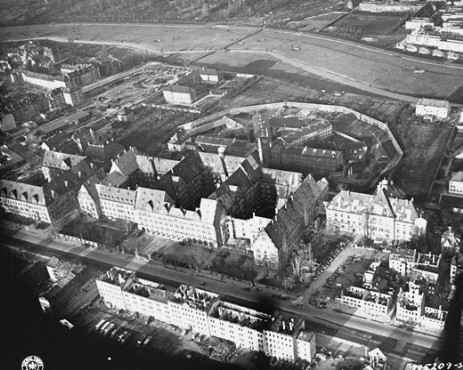
1946 Nuremberg Tribunal
: The justices continue to discuss verdicts in the Major War Criminals Trial. (See: 30 September 1946)1949 Nuclear weapons: The Soviet Union explodes its first atomic bomb. (AP)
1961 Cold War: President Kennedy signs Peace Corps legislation:
In an important victory for his Cold War foreign policy, President John F. Kennedy signs legislation establishing the Peace Corps as a permanent government agency. Kennedy believed that the Peace Corps could provide a new and unique weapon in the war against communism.
During the presidential campaign of 1960, Democratic candidate John F. Kennedy promised to reinvigorate U.S. foreign policy. He charged that the administration of President Dwight D. Eisenhower had become stagnant and unimaginative in dealing with the communist threat, particularly in regards to the so-called Third World nations. Shortly after his inauguration in January 1961, Kennedy made good on his promise for a new and aggressive foreign policy. On March 1, 1961, he issued an executive order establishing the Peace Corps. As described by Kennedy, this new organization would be an "army" of civilian volunteers–teachers, engineers, agricultural scientists, etc.–who would be sent to underdeveloped nations in Latin America, Africa, Asia, and elsewhere to assist the people of those regions. [For further information, click here.]
Edited by Levi Bookin (Copy editor) Click to join 3rdReichStudies Disclaimer: This site includes diverse and controversial materials--such as excerpts from the writings of racists and anti-Semites--so that its readers can learn the nature and extent of hate and anti-Semitic discourse. It is our sincere belief that only the informed citizen can prevail over the ignorance of Racialist "thought." Far from approving these writings, this site condemns racism in all of its forms and manifestations.
levi.bookin@gmail.com










Fair Use Notice: This site may contain copyrighted material the use of which has not always been specifically authorized by the copyright owner. We are making such material available in our efforts to advance understanding of historical, political, human rights, economic, democracy, scientific, environmental, and social justice issues, etc. We believe this constitutes a "fair use" of any such copyrighted material as provided for in section 107 of the US Copyright Law. In accordance with Title 17 U.S.C. Section 107, the material on this site is distributed without profit to those who have expressed a prior interest in receiving the included information for research and educational purposes. If you wish to use copyrighted material from this site for purposes of your own that go beyond 'fair use', you must obtain permission from the copyright owner.
Please Note: The list-owner and moderators of 3rdReichStudies are not responsible for, and do not necessarily approve of, the random ads placed on our pages by our web server. They are, unfortunately, the price one pays for a 'free' website.



